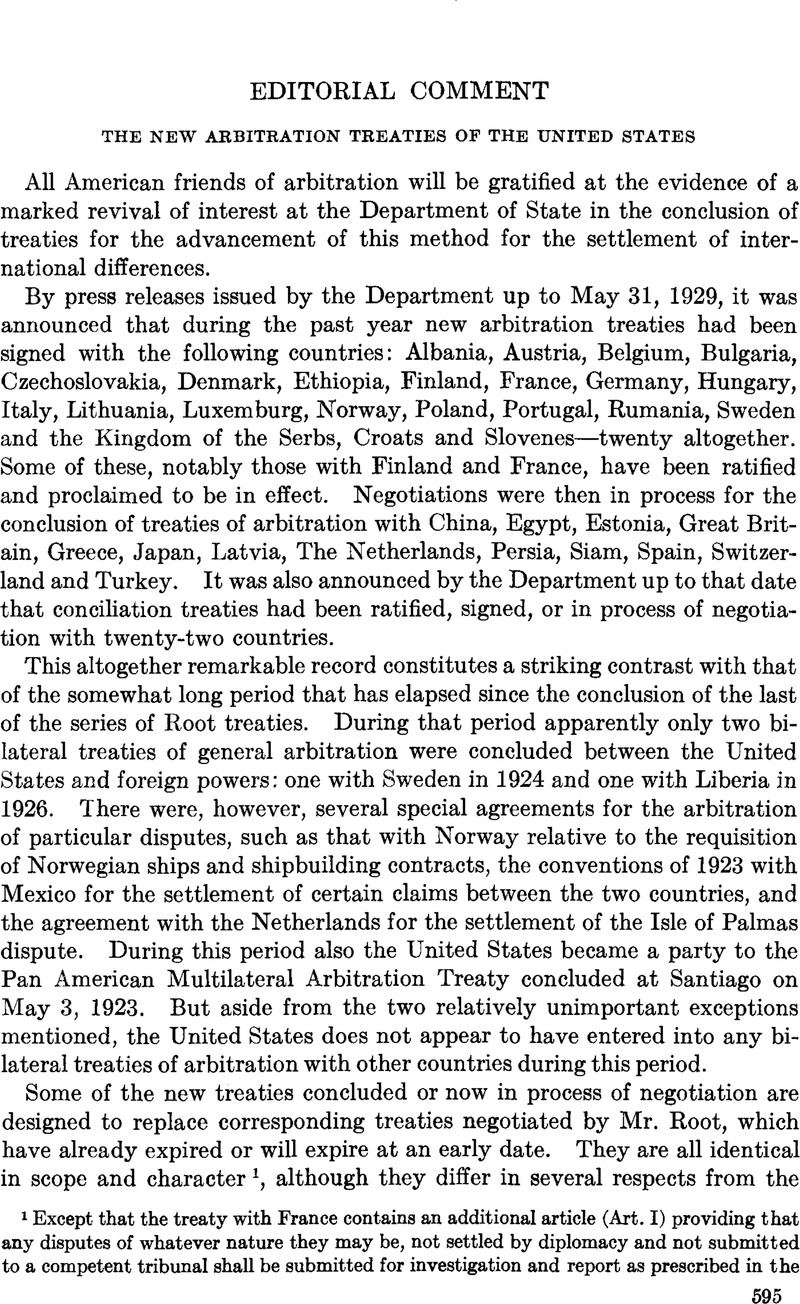No CrossRef data available.
Published online by Cambridge University Press: 04 May 2017

1 Except that the treaty with France contains an additional article (Art. I) providing that any disputes of whatever nature they may be, not settled by diplomacy and not submitted to a competent tribunal shall be submitted for investigation and report as prescribed in thetreaty of Sept. 15, 1914 (one of the Bryan treaties), to the permanent international commission constituted pursuant thereto. In view of the language of Article III of the French treaty, doubt was raised in France as to whether the Bryan treaty had not been altered and its scope limited by the terms of the said article of the new treaty. In consequence of this nncertainty the French and American governments subsequently agreed by an exchange of notes to regard the Bryan treaty as not having been affected or modified by the new treaty. None of the other new treaties contain the equivalent of Art. I of the treaty with France for the linking up of the procedure of conciliation with that of arbitration, recourse to conciliation being provided for in separate treaties of conciliation.
2 The language here employed is nearly identical with that of Art. I of the General Treaty of Inter-American Arbitration, signed at Washington on the 5th of January 1929, except that there is no reference in the latter treaty to disputes which have not been referred to a conciliation commission, that the word juridical is employed in the latter treaty in the place of justiciable and that the word equity does not appear in the Inter-American treaty as an element of the justiciability of a dispute. The coupling of the words “ law and equity” in this connection is common in general arbitration treaties, those of Latin America as well as of Europe and the United States. See a list of such treaties in the award of the Anglo-American Mixed Claims Commission under the Agreement of August 18,1910, Case of the Cayuga Indians, Nielsen's Report, pp. 315-319. The reason for the omission of the word “ equity” from the Inter-American treaty is not known to the writer
3 As to the meaning of the term “ equity” in international jurisprudence, see the awards in the Norwegian-American shipping arbitration case and that of the Cayuga Indians referred to above.
4 Rev. Gén. de Droit Int. Pub., 1904, Documents, p. 18.
5 Compare in this connection the observations of Jessup, International Conciliation, April, 1928 (No. 239), p. 208
6 The language employed in the General Treaty of Inter-American Arbitration of Jan. 5,1929 (reservation b, Article II) might however be interpreted to exclude any dispute which merely affects, without involving directly, the interest of a third state. It reads: “ Those [controversies] which affect the interest or refer to the action of a state not a party to this treaty.”
7 This Journal , Vol. XI, pp. 212, 698.
8 The reservation relative to the Monroe Doctrine, however, was omitted from the General Treaty of Inter-American Arbitration signed at Washington on January 5, 1929. But Dr. J. B. Scott (this Journal , Jan. 1929, p. 146) appears to believe that the reservation (Art. II) of disputes which “ affect the interest or refer to the action of a state not a party to the treaty” excludes from the obligation to arbitrate, disputes involving the action of non- American states contrary to what “ the Monroe Doctrine is, or is conceived to be.”Apparently also he is of the opinion that a dispute between the United States and a Latin American party involving the meaning of the Monroe Doctrine would be excluded by the terms of Article I which restricts the arbitral obligation to questions which are “ juridical in their nature by reason of being susceptible of decision by the application of the principles of law.”
9 The treaties with France and Finland containing the reservation of the Monroe Doctrine have, as stated above, been ratified and proclaimed in force. But the outcome of negotiations for the conclusion of similar treaties with other countries, Great Britain and Japan, for example, is somewhat uncertain. Whether they will consent to become parties to treaties containing this reservation remains to be seen.
10 The delegates of thirteen Latin American States at the Washington Conference on Conciliation and Arbitration, signed the General Treaty of Inter-American Arbitration with various reservations none of which, however, related to the Monroe Doctrine. This may have been due to the impression that nothing in the treaty could be interpreted as exempting the United States from an obligation to arbitrate disputes with Latin American States involving the interpretation and application of the Monroe Doctrine. Or it may have been due, on the other hand, to a willingness of the Latin American delegates to have such disputes withdrawn from arbitration, in accordance with the desire of the United States. It is not improbable that the acts of ratification on the part of both the United States and the Latin American parties may contain reservations or understandings as to the effect of the treaty on the Monroe Doctrine.